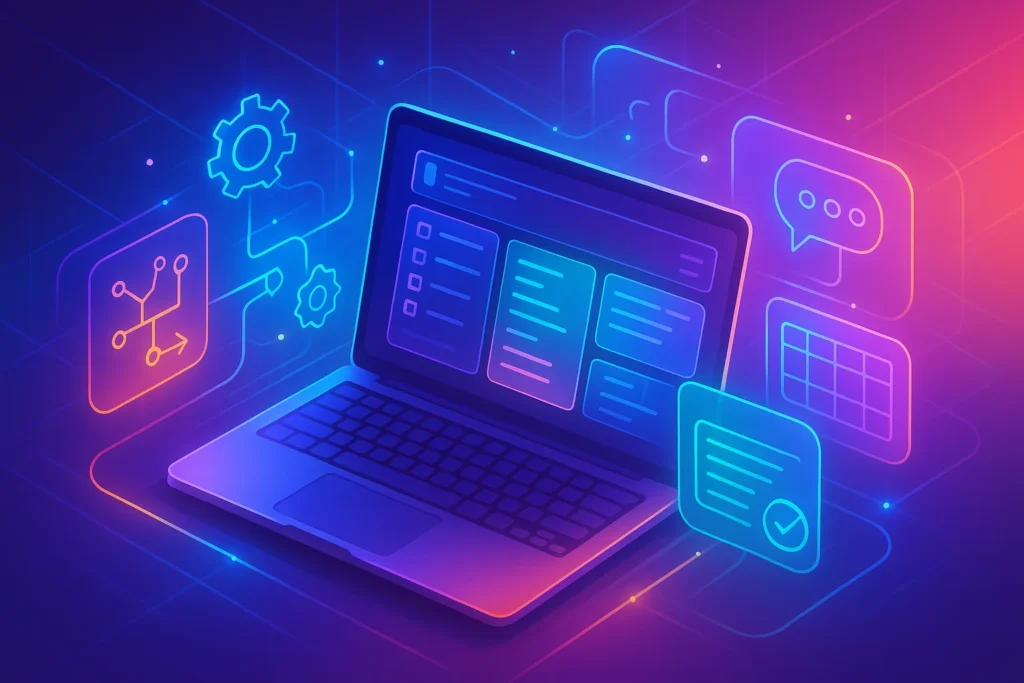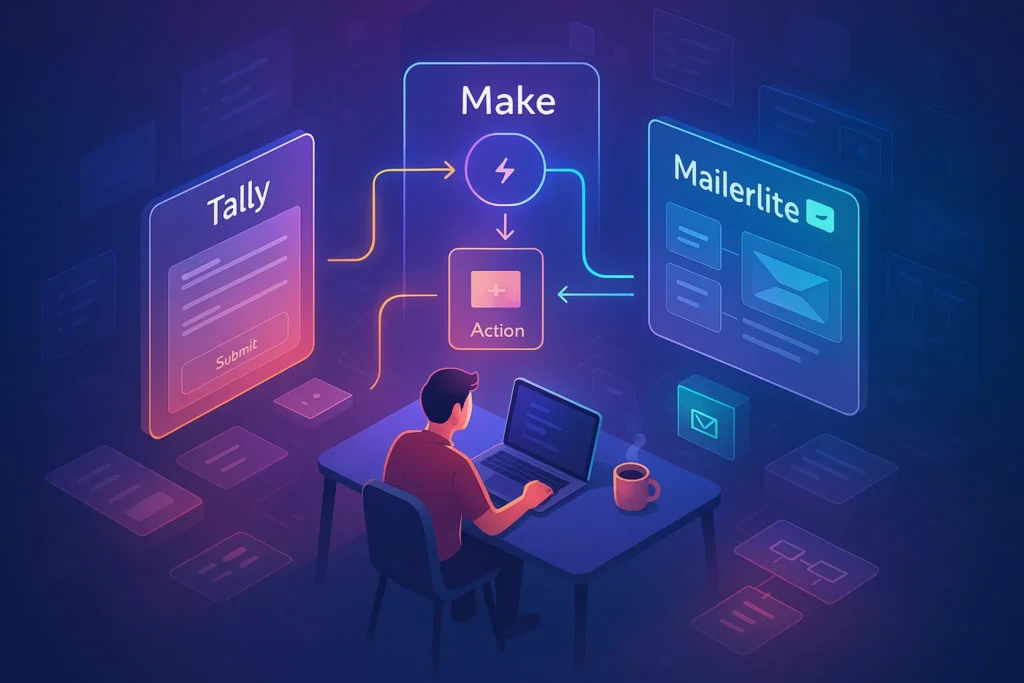Intro
Notion has evolved from being a flexible note-taking tool into one of the most powerful hubs for personal and professional productivity. What started as a digital workspace has become a central platform for creators, teams, and businesses to organize everything from simple to-do lists to complex product roadmaps. The real leap, however, comes when Notion is combined with AI integrations. With automation layered on top, your Notion setup can shift from a passive database into an active system that manages tasks, generates insights, and even communicates with other platforms.
In this post, we’ll dive into how you can transform Notion into a true automation engine. We’ll explore the difference between native Notion AI and external AI integrations, real scenarios where task management becomes self-driven, the benefits and challenges of this approach, and what the future holds for AI-powered Notion workflows. Whether you’re a solo freelancer planning content or a scaling startup running CRM pipelines, these strategies can unlock new levels of productivity.
Why Automate Task Management in Notion?
At its core, task management is about consistency. We create plans but often fail to execute them because of manual overhead: logging tasks, updating statuses, assigning deadlines, or reminding teammates. Automation removes this friction. Inside Notion, automation means your tasks update themselves when conditions change, or new work gets created when certain triggers fire. For example, if a client submits a form, a Notion database entry can be created automatically and enriched with AI-generated context, deadlines, and even priority tags.
The advantage of automating within Notion compared to traditional project management software is its flexibility. Notion doesn’t force rigid structures—it adapts. When combined with AI, it can become proactive, not reactive. Imagine a workspace where overdue tasks are automatically flagged, next actions are suggested based on priorities, and routine updates (like weekly progress summaries) are generated automatically. This is not a distant dream; it’s already possible using integrations with tools like Zapier, Make, or direct Notion API setups.
When evaluating automation, remember: time saved compounds. Each repeated task automated frees cognitive space and allows individuals and teams to focus on higher-value decisions. That’s why many professionals are exploring how Notion AI, plus integrations with GPT-based systems, can elevate task management beyond the typical “kanban board” experience.
Native Notion AI vs External AI Integrations
A key decision point is whether to rely on Notion’s native AI or bring in external AI systems. Both approaches have strengths and limitations.
Native Notion AI is embedded directly into the editor. You can ask it to summarize meeting notes, generate task lists from long documents, or rewrite project descriptions. It’s seamless and requires no additional setup. However, it’s mostly content-centric. While useful for brainstorming and refining text, it doesn’t deeply integrate into workflow automations outside Notion.
External AI integrations, on the other hand, leverage platforms like OpenAI’s GPT models, Anthropic’s Claude, or Google’s Gemini, connected through tools like Zapier or Make. With these, your Notion databases become the brain of larger systems. For instance, when a task is created, an AI model can instantly analyze its description and assign a category or suggest subtasks. Or, when a project milestone is reached, the AI could generate a performance summary and automatically send it via Slack.
This external approach is more powerful but comes with added complexity. APIs, tokens, and custom logic often need to be configured. Still, the payoff is significant. Teams looking for end-to-end automation—like turning customer support tickets into project entries or syncing CRM pipelines—will find external integrations indispensable.
💡 Nerd Tip: If you’re just starting, experiment with native Notion AI for content workflows. As your system grows, add external integrations to handle multi-platform automation.
Using Integrations to Automate Workflows
The heart of Notion automation lies in integrations. The three most common approaches are:
-
Zapier: Ideal for connecting Notion with 6,000+ apps. A typical workflow could be: when a task is marked “Complete” in Notion, Zapier sends a follow-up email to the client automatically.
-
Make (formerly Integromat): More flexible for complex workflows. For example, you could create a scenario where every new blog idea added to Notion triggers AI to generate an outline, then drafts are pushed to Google Docs.
-
Direct Notion API + AI Models: For those comfortable with coding, the Notion API combined with GPT endpoints can create highly customized systems. A developer could, for example, design an automation that predicts project risks by analyzing task dependencies inside a Notion database.
What makes these integrations powerful is how they allow Notion to act as the central command hub, while AI executes judgment-based tasks. Instead of manually classifying or updating projects, AI takes on the role of an intelligent assistant.
If you’ve ever compared Notion vs ClickUp for automation capabilities, you’ll notice ClickUp comes with built-in workflows but less flexibility for custom AI integrations. Notion’s strength is adaptability—you decide how deep you want to automate.
Want More Smart AI Tips Like This?
Join our free newsletter and get weekly insights on AI tools, no-code apps, and future tech—delivered straight to your inbox. No fluff. Just high-quality content for creators, founders, and future builders.
100% privacy. No noise. Just value-packed content tips from NerdChips.
Real-World Use Cases of Notion + AI
Theory is useful, but examples bring clarity. Let’s look at how Notion + AI is applied in real scenarios:
Content Planning: A content creator stores article ideas in Notion. When a new idea is logged, an AI integration generates potential headlines, tags, and outlines. If the post moves into “Draft” status, AI suggests SEO keywords automatically, helping streamline publishing.
CRM & Client Workflows: Agencies often manage client data inside Notion. By connecting AI, new leads added from a form can be categorized, scored for potential, and even pre-drafted with email templates. This transforms Notion into a lightweight CRM that actively engages clients instead of just storing data.
Personal Productivity: Freelancers can have AI review their weekly task database and produce a short action plan. Rather than manually reviewing all items, AI highlights the three most urgent ones and proposes time blocks in the calendar. This reduces overwhelm while keeping work aligned with priorities.
Team Collaboration: For distributed teams, Notion + AI can generate automatic meeting summaries and assign action items to each participant. By linking to Slack, these updates are shared instantly. This reduces the classic “who is doing what” problem after every call.
These cases show how Notion transforms from a static dashboard into a dynamic system. In fact, many of these workflows overlap with tools featured in our Ultimate Guide to Project Management Software, but Notion’s AI integrations offer a far more adaptable playground.
Benefits of Notion + AI for Teams
Teams that embrace AI integrations inside Notion often experience a profound shift. Firstly, communication friction decreases. Instead of chasing updates or clarifying statuses, AI keeps records accurate and even pushes reminders. Secondly, decision-making improves. With AI analyzing workloads and timelines, managers see patterns faster—like spotting potential bottlenecks before they escalate.
Another underrated benefit is employee focus. By removing repetitive admin work, AI reduces context switching. Team members spend more time on problem-solving, creative tasks, or client interaction, rather than maintaining task lists. The result is not just higher productivity, but also greater job satisfaction.
From a strategic angle, this creates competitive advantage. A company running AI-powered Notion workflows can iterate projects faster, onboard clients smoother, and scale operations with less overhead. And as AI workflow builders become more sophisticated, the possibilities for integration will only expand.
Challenges & Limitations
No system is perfect. While the potential of Notion + AI is compelling, there are challenges. One is the learning curve. Tools like Make or custom API setups demand technical understanding. Without it, workflows may break or fail silently. Another limitation is data privacy. When sensitive client or financial information flows through external AI models, ensuring compliance and confidentiality is critical.
There’s also the issue of over-automation. When everything is automated, users may feel disconnected from their workflows. AI can recommend next steps, but human oversight is vital to ensure alignment with goals. Cost is another factor. While native Notion AI comes at a fixed subscription, external integrations like Zapier can quickly become expensive at scale.
Lastly, vendor lock-in matters. Some teams find themselves deeply dependent on one automation provider, which can create risks if pricing or features change. This is why exploring open-source project management tools in parallel can provide balance and flexibility.
The Future of Notion + AI
Looking ahead, Notion is likely to move beyond basic AI writing support into AI-native task automation. Imagine databases that not only store information but also forecast project outcomes, reassign tasks based on capacity, or automatically generate roadmaps. The ecosystem around Notion is expanding too. Third-party developers are building specialized integrations—from AI research assistants to automated bug trackers—that plug directly into Notion.
As automation becomes table stakes, what will differentiate teams is how creatively they apply it. Notion + AI is not just about productivity; it’s about strategic leverage. Companies that adopt it early will find themselves operating leaner, faster, and with more clarity. For individual users, it’s a chance to design a personal operating system that feels almost alive—anticipating needs, reducing friction, and amplifying results.
The journey from manual task manager to AI-powered command hub is already underway. The question is not if, but how fast you’ll adopt it.
⚡ Ready to Build Smarter Workflows?
Explore AI workflow builders like HARPA AI, Zapier AI, and n8n plugins. Start automating in minutes—no coding, just creativity.
🚀 Quick Start: Build Your First Notion + AI Workflow in 30 Minutes
One of the biggest blockers for newcomers is knowing where to start. Let’s walk through a practical mini-onboarding so you can see results in under half an hour.
-
Create a Task Database in Notion
Open a new page, add a database table, and set columns like Task Name, Status, Priority, and Deadline. This will serve as the core hub for your automation. -
Connect Google Forms via Zapier
Imagine you want every new client request to instantly appear in Notion. Using Zapier, you can connect a Google Form submission to create a new row in your Notion task database. This eliminates manual entry. -
Enrich with AI
Add an OpenAI step in Zapier (or Make). Each time a new task is created, the AI reads its description and:-
Generates a short summary,
-
Suggests a due date,
-
Tags the priority level (High/Medium/Low).
-
-
Test the Workflow
Fill in the form once, then open Notion. You’ll see a fully structured task ready to go—enriched by AI.
💡 By following these four steps, you’ve already built a living system that saves you from repetitive admin work and boosts focus.
📊 Native Notion AI vs External AI: At a Glance
Here’s a comparison snapshot of Notion’s built-in AI versus external integrations:
| Feature | Native Notion AI | External AI Integrations |
|---|---|---|
| Setup | Instant, no coding | Requires Zapier/Make/API |
| Focus | Text generation, summarization | Workflow automation, multi-app sync |
| Flexibility | Limited to Notion’s environment | Highly customizable |
| Cost | Fixed with Notion subscription | Variable (per task or API usage) |
| Best For | Solo users, quick content tasks | Teams, CRM, end-to-end automation |
👉 Think of native AI as your in-house assistant for writing, while external AI is your systems engineer, building bridges between tools.
🔧 Advanced Use Cases: Pushing Beyond Basics
Once you’ve mastered content planning or CRM workflows, here’s where the real depth begins:
Knowledge Management: Researchers can pipe new academic articles into Notion, where AI generates summaries and highlights key findings. This transforms Notion into a living research assistant.
Software Development: Connect GitHub pull requests to Notion. Each time a PR is created, AI can summarize the code changes and flag potential risks. Teams now have technical context without digging through code manually.
HR and Recruitment: When resumes arrive via email, Zapier forwards them into Notion. AI reads each resume and scores candidates against predefined criteria. HR teams get a shortlist in seconds, not hours.
Finance and Reporting: Weekly expense data can be sent into Notion from Google Sheets. AI then generates a budget summary or anomaly report. Instead of manually combing through rows, the insights appear automatically.
These advanced layers show that Notion + AI is not just about “productivity hacks.” It’s a framework for scaling serious, high-impact operations.
🔒 Security, Privacy & Compliance Considerations
As powerful as automation is, there’s an important responsibility: protecting your data. Whenever AI touches sensitive information, you must assess what is safe to share.
-
Avoid exposing client-sensitive data. For legal or financial workflows, anonymize entries before sending them to AI services.
-
Leverage self-hosted options. Open-source automation platforms like n8n allow you to keep data within your own server rather than third-party providers.
-
Data minimization matters. Don’t push entire documents if only a task title is needed for classification.
-
Audit your workflows. Regularly check where data flows. Make sure privacy policies of your chosen AI and automation tools align with regulations like GDPR.
💡 Nerd Tip: Treat AI integrations like giving access to a new team member—you wouldn’t hand over all data blindly, so design permissions carefully.
🔮 The Future Ecosystem of Notion + AI
The current wave is just the beginning. Here’s how the evolution of Notion AI might unfold:
-
Today: Native Notion AI helps with summaries and drafting. External integrations manage workflows via Zapier, Make, and custom APIs.
-
Next 2 Years: Expect Notion to roll out automation triggers natively—databases that can auto-react to conditions without third-party tools.
-
3–5 Years: Notion evolves into an autonomous workspace. Tasks won’t just be logged—they’ll be predicted. If a recurring project is coming up, AI will prepare timelines, resources, and reminders before you even ask.
-
Ecosystem Growth: Third-party developers are building specialized AI apps around Notion—bug tracking bots, automated research companions, AI-driven knowledge graphs. The ecosystem will resemble an app store for workflows.
👉 The bottom line? Notion isn’t just a productivity app anymore—it’s becoming a platform. And AI is the engine accelerating this transformation.
🧠 Nerd Verdict
Notion by itself is already a versatile canvas for organizing tasks, but the real magic emerges when you combine it with AI. Native AI makes your content smarter; external integrations make your entire workflow smarter. The sweet spot is finding a balance—start small with simple automations, then scale as your needs grow.
In our view, Notion + AI integrations represent one of the most future-proof approaches to task management available today. It’s not about replacing human decision-making, but augmenting it so teams and individuals can focus on strategy, creativity, and innovation. If you’re serious about building scalable workflows, this is a pillar worth investing in now.
❓ FAQ: Nerds Ask, We Answer
💬 Would You Bite?
If your Notion workspace could automatically plan, prioritize, and even communicate for you, would you let it take over—or do you prefer keeping tasks fully human-driven?



